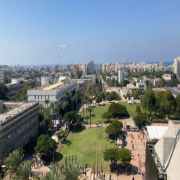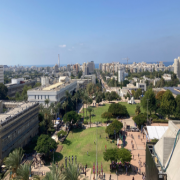Scheming, bribery and a people's rebellion
Who are the true heroes of the Hanukkah story? Did the Greeks really destroy the Temple, and why? Read the full truth behind the story of the festival of lights.
Remember those childhood stories about Hanukkah, all about bravery and adventure? The Maccabees were the heroes, fighting against the vicious Greeks, and there was a miracle involving a pot of oil. In honor of the festival of lights, we thought we'd ask the Department of Archaeology and Ancient Near Eastern Cultures of Tel Aviv University a few questions and sort out the story we all know and love.
"It all started around 160 BCE," said Naama Walzer, a student at the MA program. "Jason, the brother of the High Priest in Jerusalem, uses the rise of Antiochus Epiphanes and asks to become a High Priest instead of his brother. In those days the job of High Priest carried a lot of power and authority, it wasn't just a symbolic position. Jason promises Antiochus a pretty big bribe, as well as an increase in the yearly tax that Judea pays to the Seleucid Empire. Antiochus, of course, agrees."
Jason becomes the High Priest and tries to open Jerusalem to the rest of the Greek world. Our region, the Mediterranean, was then characterized by cities that had relationships based on commerce, culture, education and entertainment. In the whole area, the religions and cultures that predate the Greek conquest continued to coexist, together with the Greek cultural world. Jason believed that Judaism should follow suit.
So Jason was really a leader who believed in globalization and progress, before those words had even been invented?
"Exaclty. Except the progress he sought wasn't that well received by the factions in Judea, and his "dirty trick" came back to haunt him. So, another man, named Menelaus, approached the Greek authorities asking for permission to appoint a different High Priest in Jerusalem. The government in Jersulaem continued to be unstable and control of this little kingdom continued to be passed from one person to another with a lot of outside interference and constant use of Temple treasures to further the political ambitions of those who seek power."
Antiochus, who had problems of his own in terms of threats to his kingdom, loses his patience towards the chaos in the tiny city of Jerusalem. He sends in Greek troops and institutes new laws for the Jews that make it difficult for them to continue their worship.
The invasion of the Greek world into this space, physically and culturally, with the gymnasium and the naked games (in which Jews participated), brought more and more conflict, especially between the different factions of Judea. Mostly it was between those who were open to Greek culture and those who wanted to preserve their customs and continue the way of life of their ancestors. Antiochus' laws added fuel to that fire and brought about a huge explosion.
The rebellion against the Seleucid laws comes not from the capital but actually from the countryside. One Jewish family, led by Judah Maccabee, managed to outwit the Seleucid army through guerilla tactics. Maccabee arrives in Jerusalem and cleanses the Temple. After his death the Hasmonean dynasty continues to rule from Jerusalem, but not as High Priests, as all the previous rulers, but rather as kings of an autonomous kingdom, detached from Greece.
How do you, archeologists, know the details of this story?
"It's actually really interesting that our knowledge about the rebellion wasn't preserved through Jewish sources, but through the Maccabee books and the letters of Josephus Flavius. The Maccabee books weren't included in the Jewish canon, which was set during the first century CE, however the Christian church saw fit to preserve them. It's possible that HAZAL – the Jewish sages – didn't want to preserve the memory of the Maccabee rebellion because of a different and later event, the Bar Kokhba rebellion, which failed and brought about the ruin of Jerusalem. It's possible that HAZAL, through their decision, were trying to quell yet another armed Jewish rebellion against a foreign presence in Israel."
To hear more about the archeological findings regarding the Bar Kokhba rebellion and HAZAL's attempts to wipe it from historical record, you'll have to wait until the next holiday. In the meantime, we'll leave you with the comforting through that bribery, internal political conflict and freedom fighters are not simply staples of our modern times, but were also issues to contend with for our ancient forefathers.






